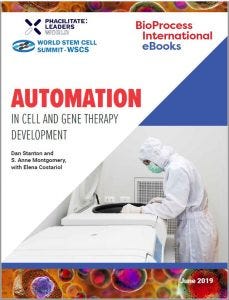Automation in Cell and Gene Therapy DevelopmentAutomation in Cell and Gene Therapy Development
June 28, 2019

 The US approvals of chimeric antigen receptor (CAR) T-Cell therapies Kymriah (tisagenlecleucel) and Yescarta (axicabtagene ciloleucel) and gene therapy Luxturna (voretigene neparvovec) in 2017 heralded a “new frontier of
The US approvals of chimeric antigen receptor (CAR) T-Cell therapies Kymriah (tisagenlecleucel) and Yescarta (axicabtagene ciloleucel) and gene therapy Luxturna (voretigene neparvovec) in 2017 heralded a “new frontier of
medicine.” But with great innovation comes great costs and criticism (such as the Kymriah’s US$475,000 price tag). Many companies argue that these one-off therapies represent good value for patients and payers compared
with traditional treatments, however, no matter your perspective, the COGs picture for cell and gene therapies isn’t good and poses a real threat to the growth of the industry. Delegates spoke about closed systems and standardized platforms, but the overarching enabler to make autologous cell and gene therapies at least cost effective is integration of automation in the manufacturing process.
This ebook, details presentations and conversations taking place at the 2019 Phacilitate Leaders World and Stem Cell Summit on this topic and much more…
You May Also Like






